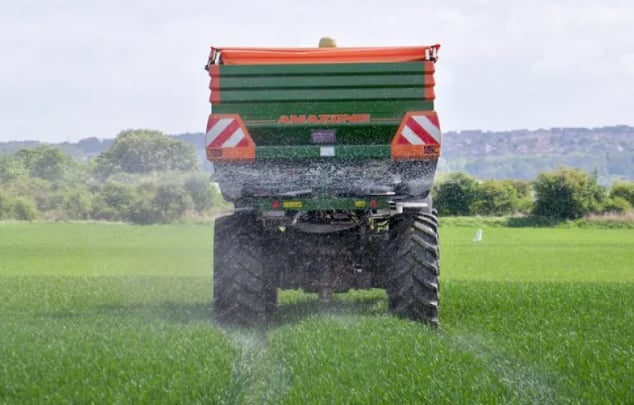November 27, 2025 | 04:14 GMT +7
November 27, 2025 | 04:14 GMT +7
Hotline: 0913.378.918
November 27, 2025 | 04:14 GMT +7
Hotline: 0913.378.918

Fertiliser prices skyrocket as a result of Ukraine crisis. Photo: WLR
The question of food sufficiency will be the focus of a meeting Prime Minister Kyriakos Mitsotakis will head on Monday, with the participation of Rural Development and Food Minister Giorgos Georgantas, as the market fears for supplies of certain categories due to the war in Ukraine and the sanctions imposed on Russia and Belarus.
Last week the government passed a clause forcing enterprises to declare their stock of wheat, fertilizers, animal feed, and corn/sunflower oil. Government officials assure there is sufficient stock in the country for many months, with the exception of sunflower oil.
Retailers also speak of sufficient supplies, although many supermarkets have already introduced limits on purchases of flour, sunflower/corn oil and even sugar, while stressing that this is a precautionary measure. The limits now concern both online and physical stores.
However, the main parameters threatening domestic as well as global production, concerning both crops and animal husbandry, is the soaring of fertilizer prices to record levels, following Russia’s decision to ban exports. Russia is the world’s biggest producer and exporter of fertilizers.
Furthermore, the increase in global natural gas rates, the fuel used in the production of many detergents, has led many European industries to reduce output. Even before the Russian invasion in Ukraine there were problems from the EU ban on potassium chloride imports from Belarus, which is the biggest producer in the world of the component also used in the production of fertilizers.
The soaring of production costs due to the above factors affecting fertilizer availability has already made producers reluctant to plant new crops, as that would lose them money. “The unrest generated due to the war will take time to end and for normality to return, according to the market,” noted Piraeus Bank in is latest agricultural products bulletin last week: “There will be plenty of challenges until then, with disruption in the supply chain, the increased cost of fertilizers and the soaring energy rates preventing the possible continuation of cultivation,” the bank warned.
The first such examples concern melons and watermelons, with planting this year already 30% below 2021 levels.
Price of fertilizer skyrockets, could impact what you pay for produce
A key product to help farmers grow their crops is starting to get pricey - fertilizer.
For 8 years now, Michael Grantz and his wife have been the co-owners of Great Day Gardens in Bedford County.
"Growing vegetables year-round is kind of a constant job," said Grantz.
At Great Day Gardens, they grow everything from spinach to cilantro.
They grow using both regenerative practice and organic methods, but about 2 to 3 percent of their annual budget goes toward fertilizer to help grow crops.
"I just got off the phone with one of our fertilizer suppliers today and they have raised prices for most things," he added.
Those prices are going up from anywhere between 10 to 30 percent.
Grantz isn't the only farmer to notice this.
"Everybody's complaining about the higher prices," said Tony Banks, Senior Assistant Director Agriculture Development and Innovation, Virginia Farm Bureau Federation.
Banks said fertilizer prices have skyrocketed.
Ammonia fertilizer prices have increased 210% from September 2020 to December 2021.
During that same period, potassium fertilizer went up 134%.
"These prices at these levels are not sustainable by any means," said Banks.
This growing concern has even pushed Republican Congressman Ben Cline to step in.
Cline is asking the Chair of the U.S. International Trade Commission to lift import costs to help chop down on fertilizer costs.
Cline provided the following statement on the issue:
"The price of food directly relates to the cost of fertilizer, meaning as producers are paying four to five times as much for their inputs, those increases are being felt not only by farmers but by every American at the grocery store as well. If the U.S. International Trade Commission lifts certain import duties on fertilizer, as I urged them to do, we could help ease the financial burden on Sixth District families. In Washington, I will continue to advocate for common-sense solutions like this that will benefit both the agriculture industry here at home and consumers across the country.”
"Anything that's imported from outside North America, especially, has seen big increases," said Grantz.
The good news for Grantz, this hasn't had much of an impact on his farm, but if the cost of this and other goods continue to rise, it could fall on consumers.
"We would have to raise prices," he said.
Grantz also said the rise in cost also made them look at how they can change their practices and be less reliant on fertilizer. That means growing more of their own fertilizer on the farm.
(Ekathimerini; wset)

(VAN) A new study reveals how the simultaneous effects of ocean acidification, salinity and loss of oxygen are making the world more fragile.

(VAN) Hopes are growing that the creation of the first 3D turkey gut model could be a turning point in the battle against the virulent blackhead disease.

(VAN) Tyson, America’s biggest meat supplier, plans to shutter one of its largest beef processing plants as the industry continues to struggle with low cattle supplies and political pressure from Washington.

(VAN) New FAO study shows how digital solutions are empowering farmers and fishers to prevent losses and build resilient agrifood systems.

(VAN) Brazil's COP30 presidency pushed through a compromise climate deal on Saturday that would boost finance for poor nations coping with global warming but that omitted any mention of the fossil fuels driving it.

(VAN) Poultry farmers in the UK have been warned that they could face one of the worst winters yet for bird flu.

(VAN) Prices of main-crop paddy have risen sharply, with jasmine rice hitting 16,100 baht per tonne — the highest level in years.